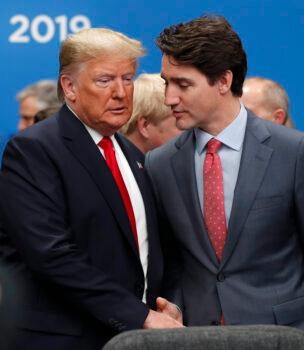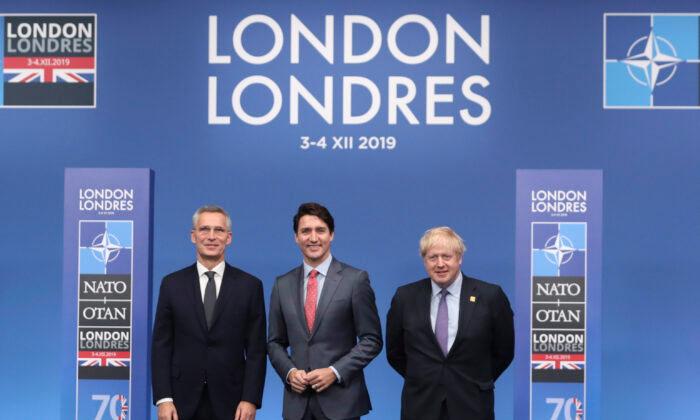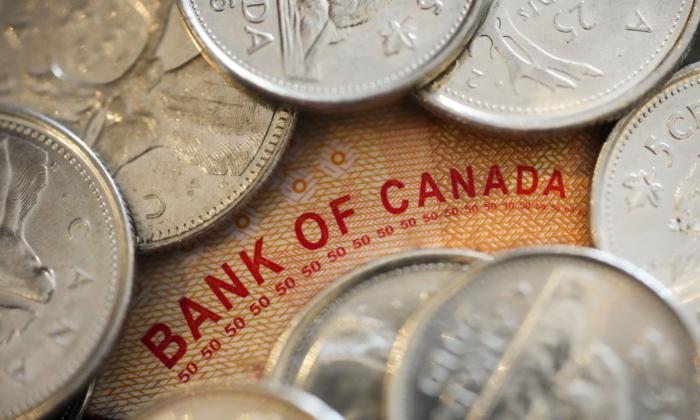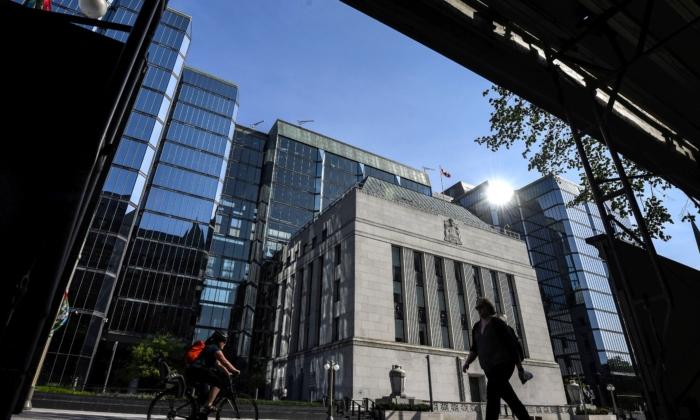OTTAWA—Canada and the North Atlantic Treaty Organization (NATO) are struggling to contend with a belligerent China on top of a revisionist Russia. It’s not unlike the motivation for the military alliance’s founding 70 years ago—to counter the communist Soviet Union at the outset of the Cold War.
But it’s the commonalities between China’s and Russia’s aggression that are most worrisome for NATO and the Western world. In the case of Canada, it has endured China’s bullying for the last 12 months without offering anything more than expressions of diplomatic displeasure in response, although it has met the Russia threat with stronger rhetoric and a military presence in Latvia.
NATO is engaged on many fronts, with Russia’s threat to Western Europe always paramount. But Russia is not a world threat like China is, said Richard Fadden, former national security adviser to the Canadian prime minister, while speaking on a panel of defence experts hosted by the Macdonald-Laurier Institute (MLI) in Ottawa on Dec. 2.
This sentiment is reflected in the London Declaration issued Dec. 4 by NATO leaders at the end of the organization’s two-day 70th-anniversary summit in London, U.K. The statement singles out China in a paragraph addressing cyber and other threats to society in areas such as critical infrastructure and energy and communications security.
“We recognize that China’s growing influence and international policies present both opportunities and challenges that we need to address together as an Alliance,” reads the concluding sentence in that paragraph.
The peril from countries like China and Russia is that they are autocratic—they can turn on a dime—whereas the Western democracies are typically slow to react due to conflicting internal priorities.
Analogously, NATO has its own share of internal strife these days. An unsettled NATO presents fertile grounds for China—and Russia—to further their purposes.
The NATO ethos was muddied recently, with French President Emmanuel Macron on Nov. 28 calling the military alliance “brain dead” and his back-and-forth with Turkey for the country’s recent military action against the Kurds in Syria. The coalition of Western nations is not as cohesive as it can be.
Many have criticized the tone of Macron’s characterization, including U.S. President Donald Trump. During his visit to London on Dec. 3 for the NATO meeting, Trump said that Macron’s words were “nasty” and “disrespectful” and that, given the purpose NATO serves, “it’s a very dangerous statement for [Macron] to make.”

Trump, who is a strong supporter of NATO, is also taking a decisive approach as leader of the world’s most powerful nation and the country that has traditionally been the one to maintain world order. Among the 29 NATO members, the United States continues to spend the highest percentage (3.42 percent) of gross domestic product (GDP) on defence.
In addition, Trump has not shied away from being vocal in urging other members to pay their fair shares and meet the defence spending target of 2 percent of GDP. Only nine countries currently meet this target.
NATO 2.0
At the same time, because of the dangers posed by the China and Russia of today, some experts point out that NATO does need a rethink.
“NATO is in trouble after the Cold War ended. It had to find a mission,” said Elliott Tepper, the chair of the MLI panel and a professor of comparative politics and international relations at Carleton University.
Fadden says NATO needs to develop a “Mark II”—a broader Western alliance. Countries like Australia and Japan, among others, share similar concerns about Russia and China, with the latter continuing to gain world influence. For example, as a non-Arctic country, it gained observer status in the Arctic Council in 2013 and hosted its first Arctic Circle forum in Shanghai this past May.
“NATO needs to get its collective mind around this. NATO needs a policy or doctrine to deal with China in a comprehensive way,” Fadden said.
China is an expert at dividing and conquering. In Europe, it curries favour with smaller nations and offers itself as an alternative to Germany and France. And while Russia, by supplying gas, has entrenched leverage over a large portion of Western Europe, China’s activities to bankroll smaller nations’ infrastructure projects around the world is even more worrisome on a global scale.
‘Terrifying’
Fadden is in the camp of favouring a rapprochement with Russia—a strategy Macron emphasized. The rationale is that, at least this way, China and Russia aren’t forced even closer together.
“The idea of Russia and China teaming up all the time is also terrifying,” said Leah West, a former Dept. of Justice national security lawyer and current lecturer at Carleton University, who also advocates for dialog with Russia.
A major threat posed by a Chinese-Russian partnership is the two countries’ efforts to undermine the rules-based world order and shift the balance of power in their favour. An example West provides is their increasing tightening of state control over the internet, in stark contrast to the idea of a free and open internet supported by NATO members in general.
When it comes to dealing with cyber threats, NATO is still in the nascent stage.
Russia and China have differing approaches to conducting cyber attacks, but West believes that China could be learning from Russia’s more surgical approach.
“Disinformation for example—Russia’s specialty. When you’re trying to influence diaspora communities within Canada, that’s a solid tactic,” she said.
It’s not in NATO’s purview to defend national elections, and the recent Canadian election appears to have taken place without any interference, but it’s a menace that needs to be monitored.
Defence Spending
Fadden says Canada needs to spend more on defence. This has been a long-standing sticking point with its allies—especially the United States.
At the NATO gathering on Dec. 3, Trump directly questioned Prime Minister Justin Trudeau on Canada’s defence spending.
“Where are you now? In terms of your number … 1.3 [percent of GDP]?” asked Trump.
Trudeau responded with “1.4,” adding that “Canada has been there for every NATO deployment … We continue to step up like most of our allies.”
To this, Trump replied: “They’re getting there. They know it’s important. … It’s to their benefit.”
According to NATO’s 2019 estimates, published on Nov. 29, Canada is on track to spend 1.31 percent of GDP.
“We have taken advantage over the years after the Cold War. … We didn’t see a very clear threat,” Fadden, a former deputy minister of national defence, said in an interview.
Canada’s problem is that it doesn’t feel threatened due to its geographical separation by three oceans, Fadden added.
To get to 2 percent, Canada would have to spend about US$11.5 billion (C$15 billion) more every year, based on NATO’s estimates of Canada’s 2019 GDP.
The federal government emphasizes that Canada, a founding member of NATO, is one of its major contributors. Among other operations, Canadian forces are leading a NATO battlegroup in Latvia and commanding NATO’s mission in Iraq. It also provides army trainers to a NATO training mission in Ukraine.
On the conclusion of the NATO meeting on Dec. 4, Trudeau announced that Canada is increasing its contribution to the NATO Readiness Initiative by six fighter aircraft and a frigate, at the NATO Secretary General’s request.
It’s unlikely that Canada rallied greater support from its allies in London for its grievances against China such that it would cause a sea change in the strained relationship between the two countries. But if and when Canada decides to take steps to concretely push back on China, it becomes crucial for it to have allies, such as those in NATO, having its back, Fadden says.
A well-funded and cohesive military alliance is vital for dealing with the 21st-century dual dangers of China and Russia from a variety of fronts, including cyber.





